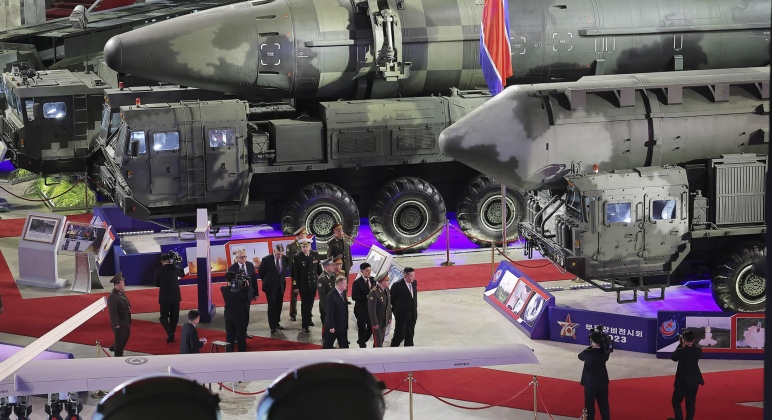News
Expert Highlights Loopholes to Legalise Russian-North Korean Arms Trade: Weapons ‘Sharing,’ ‘Joint’ Units and ‘Advisors’ on the Battlefield
In the aftermath of the White House’s announcement on January 4 that Russian forces were utilising North Korean ballistic missiles in their ongoing war effort in Ukraine, the possible future avenues that growing defence cooperation between Moscow and Pyongyang could take have gained growing attention from a range of analysts in Russia, East Asia and the Western world. The North Korean KN-23B missile class used in Ukraine is currently considered the most potent tactical ballistic missile class in the Russian arsenal or anywhere in Europe, with its engagement range being 80 percent longer than that of its Russian rival the Iskander-M while its weapons payload is reportedly over three times as large at a tremendous 2500kg. North Korean KN-25 rocket artillery systems also reported to have been seen in Ukraine have over double the range of their top Russian counterpart the 9A53-S Tornado, with Korean armaments thus revolutionising the Russian Army’s reach with both missile and artillery attacks. Transfers of North Korean artillery reported to have begun in 2022 and escalated the following year are also expected to significantly expand the Russian Army’s ability to sustain high rates of fire at a time when Ukrainian units increasingly fall short of ammunition and have to cut firing rates to small fractions of their former volumes.

Although arms trade between Russia and North Korea has the potential to bring tremendous benefits to both countries, United Nations Security Council Resolution 1718 adopted on October 14, 2006, followed by Resolution 1874 adopted on June 12 three years later, specifically prohibited UN member states from acquiring armaments from the East Asian country or selling armaments other than small arms to the country. Leading expert on North Korean security A. B. Abrams accordingly on January 10 highlighted a number of means by which Moscow and Pyongyang could attempt to legalise their arms trade by exploiting loopholes in the embargo, citing multiple precedents of countries having done so in the past. He observed one of the most promising options as follows:
“would be to use the premise sharing of weapons systems and formation of joint units between the two countries. For example, it could be claimed that North Korea has not sold artillery and ballistic systems to Russia, but rather than these are being either operated by Korean personnel or, perhaps more feasibly, that they are jointly operated by personnel from the two countries. Even one North Korean officer in the vicinity could be sufficient to claim it is a joint operation.”
Abrams highlighted that Russian media sources have widely reported since mid-2022 that North Korean personnel would be deployed to Eastern Ukraine, specifically leveraging their expertise in artillery operations, and that Pyongyang had a long history of dispatching its forces in both advisory and combat roles to support U.S. adversaries in conflicts ranging from Vietnam and the Arab-Israeli Wars to Syrian counterinsurgency efforts in the 2010s.

Abrams observed that the sharing of weapons systems and formation of joint units had both been used to attempt to legitimise politically controversial military deployments in the past, an example being the creation of joint Sino-Soviet fighter units during the Korean War which allowed the Soviet Air Force to provide air defence to Chinese positions in the Korean War while ensuring Moscow could continue to deny that it was an active belligerent. Another, he observed, was America’s nuclear sharing agreements from 2000s with NATO members Belgium, Germany, Italy, the Netherlands and Turkey, allowing them to “host American nuclear weapons on their territory, train to use these weapons, and field suitable delivery vehicles to conduct nuclear strikes. This was done with the intention that in the case of war, nuclear warheads would be immediately transferred to the hosting countries – for most intents and purposes turning them into nuclear weapons states.”
A similar ‘sharing’ of North Korean military equipment with Russia, or of future Russian arms exports to North Korea, could allow both to claim that no exports had been made – mirroring Washington’s claims that it was not proliferating nuclear weapons to its allies. Although Russia approved UN arms embargoes on its neighbour in the 2000s, at a time of more positive relations with Washington and in an effort to uphold the global nuclear non-proliferation regime, Russian representatives at the Security Council insisted that this end once North Korea cooperated with the international community on its weapons programs. Russian officials have since 2018 repeatedly insisted that Pyongyang had offered to do so. This and the United States’ unwillingness to accept mutual concessions on the issue during negotiations in 2018 and 2019 was a major factor in the embargo having effectively lost Moscow’s support.












